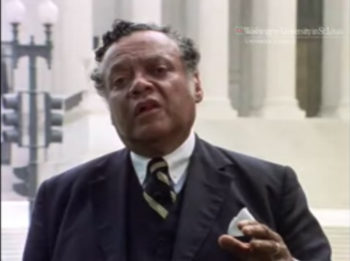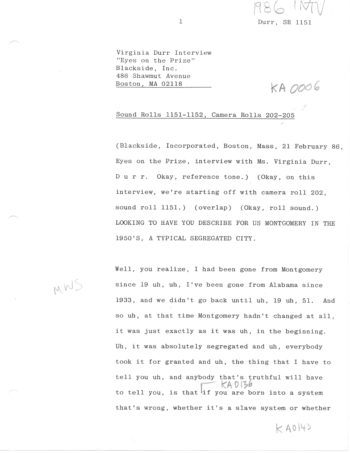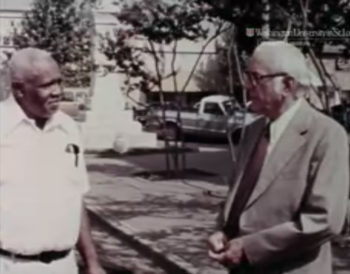
Eyes on the Prize Interviews Now Digitized and Available Online
The Washington University Libraries are pleased to announce the completion of the Eyes on the Prize Digitization and Reassembly Project made possible by a National Historical Publications and Records Commission (NHPRC) Grant. For the first time researchers, scholars, and the general public will be able to view the complete interviews with the accompanying transcripts from the groundbreaking series Eyes on the Prize, produced by filmmaker Henry Hampton.
Principal Investigator and Associate University Librarian Nadia Ghasedi, Cataloging and Metadata Archivist Irene Taylor, Digital Archivist Jim Hone, and other staff from Special Collections and Scholarly Publishing all contributed to this project to make unseen outtakes from the landmark series available to the public for the first time via Washington University Libraries’ Digital Gateway.

“Since coming to the Libraries 10 years ago, I have dreamt of the day when we would make these historically and culturally significant interviews available in their entirety,” says Nadia Ghasedi. “I am so thankful to the Mellon Foundation and NHPRC for their support. And I am honored to have had the opportunity to lead these projects and grateful for the expert and hardworking staff that have seen them through to successful completion. As a result of the Libraries efforts, these stories of struggle and perseverance will live on for generations to come.”
With the completion of this project, Washington University is now a Hydra partner [Hydra is now known as Samvera]. Hydra, an open source software used by a community of institutions, enables the preservation and delivery of diverse material types through customizable applications that sit on top of a centralized repository.
This digitization and reassembly project began after the first six hours of the series and the original film and audio elements of the associated interviews were preserved during the Andrew W. Mellon Foundation-funded Eyes on the Prize Preservation Project. The preservation of over 75 hours of complete interviews, including never-before-seen outtakes totaling 375,000 feet of film was the first step to ensure these interviews were not lost due to the deterioration of the original acetate film.
Irene Taylor described the process of working on both grants: “My time spent on the NHPRC grant has been an extremely rewarding learning experience. Prior to this grant, the Film & Media Archive had been fortunate to receive a preservation grant from the Andrew W. Mellon Foundation. During the Eyes on the Prize Preservation Grant, my time was spent ensuring the film and audio elements were cataloged prior to being shipped to Colorlab, the preservation lab that then conducted film-to-film preservation. Halfway through the process, I would receive inspection reports from Colorlab’s Laura Major, who was the dedicated technician throughout the Mellon grant. These would frequently be informative as it discussed the condition the film was in—in general, most of the film elements were in very good condition. The condition information would then be added to the catalog record.”
The next step was to digitize and reassemble the complete interviews to make them readily accessible to researchers, scholars, and the general public. During the project, Jim Hone, worked with 375 digitized camera rolls, 204 digitized sound rolls, 13 digitized episode interpositives, and 13 digitized sound mags to process and reassemble all the interviews now available on Washington University Libraries Digital Gateway. The total running time of all these interviews is 76 hours 29 minutes and 58 seconds.
Some of the greatest challenges of the project involved the 1979 pilot interviews. Henry Hampton originally received funding to make a program on the civil rights era from Capital Cities/ABC in 1979. The Blackside team shot over 30 interviews during this first phase of production before creative differences brought a temporary halt to the project. In reassembling these interviews, some of which had no identifying information on them at all, the grant team had to do archival detective work to piece back together interviews from multiple reels, both sound and audio.
Jim Hone described some of the problems posed by these early interviews: “Hampton and his crew of fledgling filmmakers were trying to develop a project original in both subject matter and approach for Capital Cities/ABC. They must have been facing enormous budget and time constraints, as well as their own inexperience. Their record keeping was rushed and disorganized. Most of the interviews are without visual or audio slates. When the project was finally put into storage, many of the camera rolls were simply concatenated together without regard to order. So the principal challenge in bringing sound and picture back together again was to establish original order—a very archival pursuit.
“A good example: When I reassembled the 1979 interview with John Lewis, I was dismayed to discover that we were missing more than five minutes of sound for the first camera roll of the interview. Several years ago, one of Blackside’s longest serving producers, Judy Richardson, sent a short reel of ¼” audio tape to the archive. At the time, she mentioned it was Lewis talking about his childhood on a chicken farm.
“I was not familiar with this tape or the story of its provenance. However, Irene Taylor, our cataloging and metadata archivist, thought we should send it to the vendor, Crawford Media Services, for digitization. A few weeks later, when we got it back, we were happy to discover that it was indeed the missing segment. It turns out that John Lewis wanted to be a pastor from his early childhood and in his zeal he would preach to the chickens!”

Another problem the grant team encountered was mislabeled or misidentified reels. Many times discrepancies were discovered during the digitization process. Irene Taylor describes an example of dealing with this situation, “Jim Hone would inform me that rather than having one interview on a certain camera roll, it was actually the end of one interview and at the beginning of another. In a few instances the reverse turned out to be true—one audio roll that we thought had portions of both interviews with Burke Marshall and Kenneth Clark only turned out to have audio for Kenneth Clark. Once again changing the catalog records was necessary to reflect the updated information.”
In addition to the work of digitizing and reassembling, other members of the team worked on correcting spelling and name errors and added time code to the TEI-encoded transcript files so that the video and transcripts would synchronize at two-minute intervals. This synchronization of video and text allows viewers to identify exact quotes and view sections of the interview side-by-side. This work was done by Film & Media Archive Processing Assistant Barry Kelley, Film Preservationist Tyler Bequette, and Reference and Outreach Supervisor Alison Carrick. Kelley and Film & Media Curator Brian Woodman revised and edited the biographies of the interviewees. Woodman also solicited feedback from a diverse group of stakeholders including faculty and students at Washington University and other universities, filmmakers, and archivists about the project and the functionality of the interface.
The Digital Gateway site was produced by the Washington University Libraries Scholarly Publishing Department under the direction of former Digital Library Services Manager, Shannon Davis; Andrew Rouner, Scholarly Publishing Director; and Kieran Etienne, formerly the Digital Infrastructure Librarian. A full list of the interviewees with links to the interviews and biographies can be found in the following Eyes on the Prize Interviews links: Eyes on the Prize Series I and Eyes on the Prize Series II.
The Film & Media Archive is very proud to have been able to preserve and digitize these historic interviews and make them available for researchers, faculty, students, and the general public to view and enjoy.

